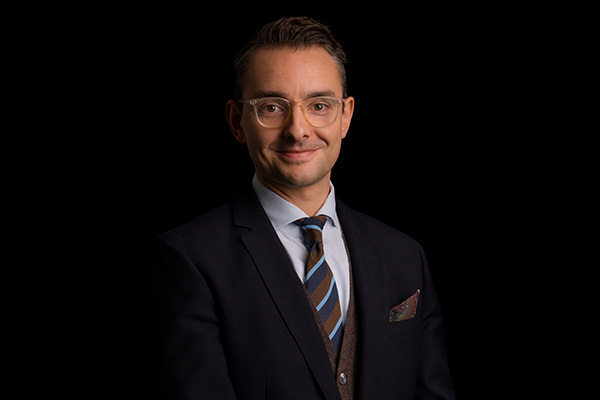Janus Juul Eriksen
Research leader

Project title
FESCOP: Focused Simulations of Electronic Structure in Composite Phases
What is your project about?
The meeting between light and matter brings about transitions of electrons from their ground to higher-lying excited states whenever the quantized energy difference between these matches the wavelength of the incoming radiation. Today, the majority of chemical reactions known to us involve some kind of electronic transition and these occur most often in condensed phases. From a theoretical point of view, this poses a significant problem as computational determinations of optical phenomena are often inefficient whenever these do not take place in vacuum. As such, my project is concerned with innovative new means of complementing experimental investigations of the underlying electronic transitions through the development of novel simulation tools capable of advancing on chemical studies within both solutions and biomolecular systems at an unprecedented efficiency.
How did you become interested in your particular field of research?
My training as a chemist relies more on a series of sheer coincidences than anything else, and to that extent, the fact that I have ended up as a theoretician is likely more rooted in a lack of both competences and interests for more experimental lab work. My reasons for staying put in academia, however, are driven by a fundamental thirst for knowledge on how the inner workings of matter are shaped (and affected) by a manifold of chemical interactions, but also a desire for exploring novel ways of how best to leverage computers in simulating these forces.
What are the scientific challenges and perspectives in your project?
As a rule of thumb, the higher the accuracy one wishes to simulate electronic interactions at, the higher the combined expenses will amount to, measured in terms of both time and financial resources. An integral part of my scientific work revolves around the development of new, improved approximations to the exact theory behind the intimate dance in-between electrons, and a long-term goal of mine is to find use for these in a broad spectrum of applications within both academia and industry where a satisfactory compromise between costs and accuracy is desired. For instance, a suitable trade-off between these factors is crucial when one seeks to complement experimental studies of reaction mechanisms with a sound theoretical basis. In order to accomplish this, however, a deeper and more nuanced understanding of the various manners by which properties derived from the electronic structure of a molecule become changed in the shift from gas to condensed phase is required, and these are some of the fundamental scientific questions that my research group and I have a strong interest in elucidating in ever richer detail.
What is your estimate of the impact, which your project may have to society in the long term?
Being able to predict and rationalize electronic transitions is of paramount importance in a wealth of scientific areas, e.g., the rational design of new materials and drugs or the fundamental understanding of reactivity across all of chemistry and biology. How do electrons interact in molecules and crystalline solids? Which are the factors that rule how complicated a thorough description of a given compound’s electronic structure will be? And when may we allow for flexibility and pragmatism in our approximations of quantum mechanics, under which assumptions, and at what accuracy? These conundrums are all enormously pertinent to me in my career as an academic researcher of theoretical quantum chemistry where I furthermore work hard on implementing our developed algorithms into optimized computer software. By means of our codes, we are today capable of simulating energy levels and charge distributions for a broad suite of systems across chemistry, biology and solid-state physics, whereby changes to properties like these that result from reactions or structural changes can be determined at high precision.
Which impact do you expect the Sapere Aude programme will have on your career as a researcher?
This Sapere Aude grant will make it possible for me to further diversify my research and the many scientific topics and problems we have become interested in. In particular, this grant will allow for my research group to continue to grow and thus enable more long-term and ambitious targets as a result. As part of my project, I will seek to hire a 3-year PhD student as well as a 3-year postdoctoral researcher, and both in the development of new theory and computer software, but also in the subsequent practical applications of these will the project involve a new scientific collaboration of ours with leading domain experts from the university of Pisa in Italy.
Background and personal life
When I am not spending precious time in the company of my two children and my girlfriend, I love to devote myself to the arts, literature, and modern as well as classical music. Having lived for a number of years outside our national borders in Germany and the UK, respectively, I am now thoroughly enjoying my move back home to Frederiksberg where I attempt to frequent as many of our capital’s many cultural offers, restaurants, and musical orchestras as possible.
View all research leaders here
Research institution
Technical University of Denmark
Research field
Chemistry
City of your current residence
Frederiksberg
High school
Amtsgymnasiet in Odder
